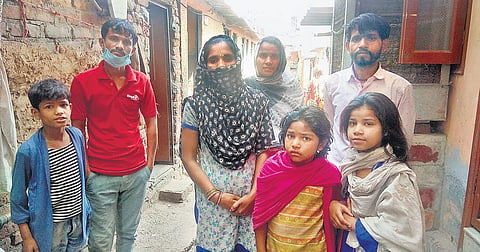

NEW DELHI: In Delhi’s informal settlements, anger among the people is palpable — of hunger, loss of livelihood, lack of ration, and the uncertainty looming before them. The fear of infection is among them too but where is the uninterrupted supply of water and the scope for social distancing, ask women at the densely populated Tigri village in Sangam Vihar.
“It is like a situation when you are neither alive nor dead. We are extremely troubled by this lockdown,” says Sombatiya, 60. While they understand the need to be at home, the lack of rations is overwhelming for large families, says Anju. “Children keep crying for milk. And we cannot provide for it. This is not easy for us.” To make thing worse, a significant number of the families at this urban village do not have ration cards. “We need ration because we have lost daily and monthly wages. The government cannot solve our problem by giving us three pooris with aachar (pickle) for dinner,” says Asha.
Yet there is some hope as the government has announced to provide rations to even families without ration cards in this tough period. Around 10 lakh people do not have ration cards in Delhi by the government’s own estimates. At another informal settlement in Tughlaqabad, a resident admits steady income is something unheard of. “Our only source of income is ‘maang ke khana’ (begging). And police is beating us if we move to Sai Baba ki mandir. What can we do? We are hungry,” says Hari Singh.
Cluster after cluster, the same story plays out. As many clusters are away from schools where the Delhi government is distributing food, and the scare of contracting the infection, the people conceded food is becoming scarce every day. In a cluster inhabited by the Gadia Lohar community at MB Road’s Lal Kuan, Geeta Devi serves roti (chappatis) to her children as there is no oil for daal. Traditionally, the Gadia Lohar community is into manufacturing and selling iron tools and utensils.
A survey by advocacy group Housing and Land Rights Network said over 40 per cent of the Gadia Lohar settlements lacked access to clean drinking water and 75 per cent of the settlements surveyed lacked access to medical and healthcare services. Though the situation for rations marginally varies at Badarpur’s Subhash Camp, the buzz is ‘yeh bimaari se bachna hain (We have to save ourselves from this disease)’. “It is difficult for us with not having any income for at least 15 days now. But we are trying to buy soaps, handwash and shampoo to maintain hygiene. The government should provide us with these,” says Talbun Nisha, a toy seller.